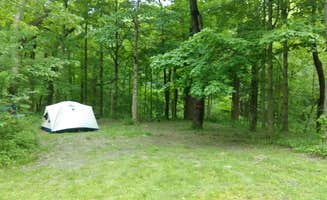Tent camping near Oakwood, Illinois puts campers within 30 miles of several Indiana campgrounds offering primitive and modern amenities. The region sits on the Illinois-Indiana border at elevations between 500-700 feet, characterized by rolling hills, hardwood forests, and several waterways. Summer temperatures typically range from 60-85°F with occasional thunderstorms, while spring and fall camping seasons offer milder conditions with highs in the 60-70°F range.
What to do
Fishing opportunities: Lake Waveland Park provides a stocked fishing lake popular with local anglers. "If fishing is your way of relaxing, you should have a good time here," notes Randy A., who appreciates the extensive green space maintained by the grounds crew.
Seasonal events: Lake Waveland hosts family-friendly events throughout the camping season. According to Nicole B., "Fireworks in July and Halloween for the whole family in October" are special attractions beyond the standard camping amenities.
Birdwatching: The natural areas around primitive campsites provide excellent bird habitat. William David S. describes the camping area as "a lovely space with lots of birds to observe" throughout the expansive, reasonably well-mowed primitive camping area.
What campers like
Spaciousness: Tent campsites near Oakwood offer more room between sites than many public campgrounds. As Nicole B. points out, there are "tons of primitive" sites available, giving campers ample space to spread out away from others.
Well-maintained grounds: The cleanliness of facilities and overall upkeep receives consistent praise. "Really well maintained grounds," says Katie R. about her camping experience at Lake Waveland Park.
Peaceful atmosphere: Campers frequently mention the quiet environment. Douglas W. describes his experience as "Small but peaceful campground. Well worth the time spent here," highlighting the tranquil setting that makes camping near Oakwood appealing.
What you should know
Arrival timing: For primitive tent camping areas operating on first-come, first-served basis, early arrival is important. "The site fills up pretty fast so come early. No need to pay because it is first come first serve," advises Kevin T. about securing a spot at Lake Waveland.
Site identification: Primitive sites may not be clearly marked at all locations. Look for picnic tables and occasional fire rings as indicators of designated camping spots, though fire rings aren't consistently present at all sites.
Seasonal operation: Most campgrounds in the region operate on limited schedules. Lake Waveland Park's camping season runs from May 15 to October 15, requiring campers to plan accordingly for spring, summer, and fall visits.
Tips for camping with families
Beach access: Lake Waveland includes a swimming beach that provides water recreation for families. "They do have a beach," mentions Nicole B., which offers an additional activity option for children during summer camping trips.
Facility limitations: While basic amenities exist, some infrastructure shows its age. William David S. notes the campground is "Not fancy, some updating of infrastructure is due," suggesting families should prepare accordingly for basic rather than modern facilities.
Site selection: For families camping with larger groups, arriving early helps secure adjacent sites. The primitive camping area's layout doesn't feature designated site boundaries, allowing flexibility but requiring timely arrival during busy periods.
Tips from RVers
Site suitability: RV campers should note size restrictions at electric sites. According to Nicole B., "they need more spots for those long campers. lots of pop up size sites," indicating that larger rigs may face challenges finding appropriate hookup sites.
Tree management: Overhanging branches can be an issue for taller RVs. "Trees need cut or maintained," suggests Nicole B., a consideration for RVers concerned about potential scratches or damage to their vehicles from tree limbs.
Hookup availability: Modern sites at Lake Waveland include basic utilities. "The best part is sites include water and electric," notes Nicole B., though sewer connections aren't mentioned, suggesting campers should plan for appropriate tank capacity during their stay.


